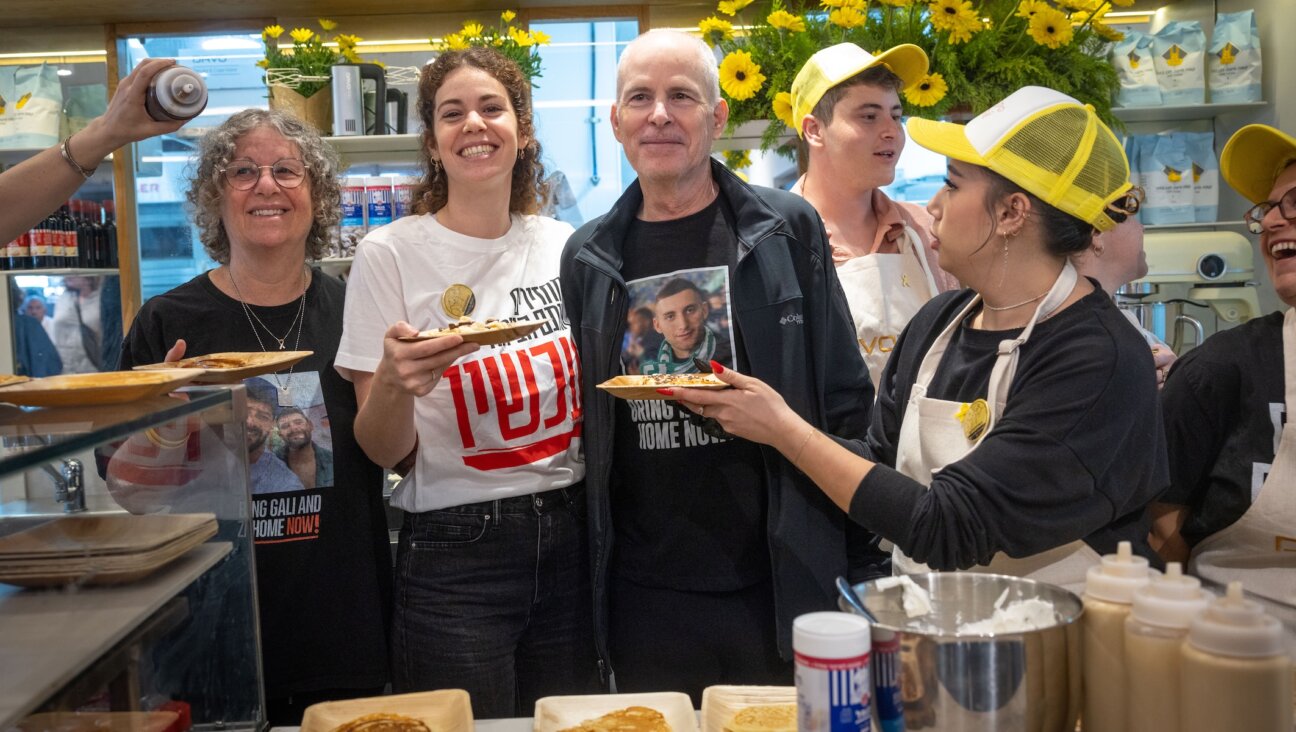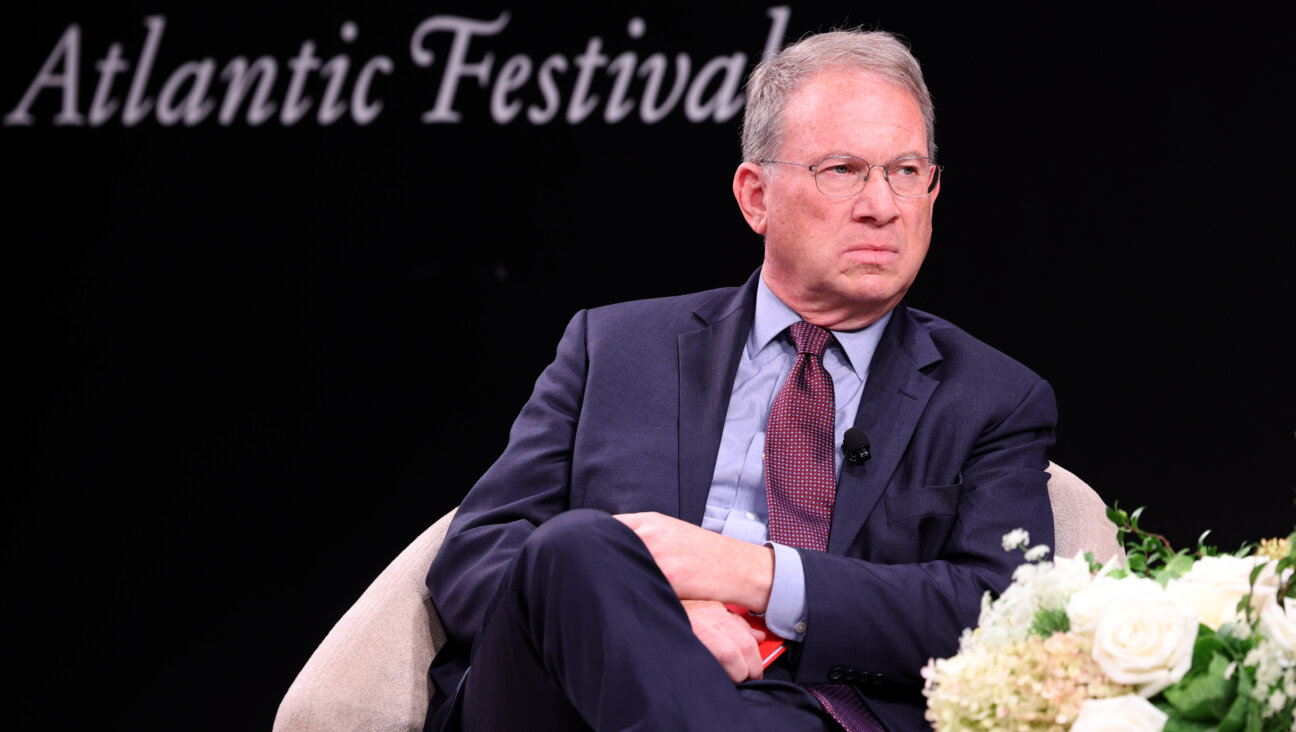Touro Struggles With Its Historic Legacy

Under Construction: The Touro Synagogue (center) is facing financial trou-bles even as work proceeds on the buildings for a multimillion dollar visitors center (left and right). Image by ANTHONY WEISS
On a recent sun-washed Saturday morning, after the conclusion of Sabbath services at the historic Touro Synagogue, some 20 members gathered outside and gazed across a barren dirt patch toward where the Ambassador John L. Loeb Jr. Visitors Center — an immaculate new stone building and a peeling old wood frame house under renovation — is taking shape.

Building the Future? Construction continues on a new visitors center adjacent to the Touro Synagogue, the country?s oldest standing synagogue and a landmark of American architecture and history. Image by ANTHONY WEISS
The men and women of Congregation Jeshuat Israel, the small Orthodox congregation that prays at Touro, were carrying on a centuries-old tradition in Newport. Dedicated in 1763, Touro is the oldest standing synagogue in the country and arguably the most important Jewish historic site in America. Thanks to President Washington’s famous letter to its members in 1790, promising them equal rights in a new nation that would “give to bigotry no sanction, to persecution no assistance,” it is also a landmark of American religious freedom and of the unbroken presence of Jews in this country as full citizens.
When the multimillion-dollar visitors center opens in August, it will make Touro’s proud legacy accessible to tens of thousands of new visitors. But the gleaming construction stands in sharp contrast to the synagogue next door — aging, shrinking, and desperate to stay alive.
John Loeb Jr., the primary funder of the visitors center, has invested some $10 million to tell the story of how the separation of religion and state described in Washington’s letter has protected Jews, and how Jews, in turn, have helped build the nation.
But to the congregation, Touro is a different story, one of prayer, ritual and ongoing Jewish communal life, and it appears that their story may lose out. So desperate is the synagogue’s financial situation that it is quietly making inquiries about potentially selling some of its assets, including a 19th century mansion that holds the synagogue’s offices and two sets of rare silver rimonim (covers for the handles of the Torah scroll) that were crafted by colonial-era Jewish silversmith Myer Myers and have belonged to the synagogue since that era.

Under Construction: The Touro Synagogue (center) is facing financial trou-bles even as work proceeds on the buildings for a multimillion dollar visitors center (left and right). Image by ANTHONY WEISS
“We’re down to the tough decisions now,” congregation co-president Saul Woythaler said.
But as tough as it would be for the congregation to sell its most treasured artifacts, the alternatives are looking even tougher — perhaps fatal. Without an infusion of cash from somewhere, the congregation might not be able even to afford its rabbi. “The minute it doesn’t have a full-time rabbi, then it doesn’t function as a synagogue anymore,” warned Bea Ross, the congregation’s other co-president. She added, “If it isn’t open as a house of worship, then it just becomes a museum, and the world doesn’t need another museum.”
Jews have come and gone from Newport like the tide. The first Jews arrived here in 1655 from Barbados. They established a Jewish cemetery, which still exists, and secured an assurance of religious toleration from the Rhode Island government. But the community was too small to sustain Jewish life, and by 1688 they had disappeared.
More Jews, mostly merchants, arrived in Newport in the 1730s and ’40s. This time they established a thriving community and built Touro Synagogue, a substantial landmark that testified to their stature in Newport society. But after the American Revolution, Newport declined in importance as a seaport, and the Jewish population once again drifted out of town. In 1805, Moses Lopez, the son of one of the synagogue’s founders, handed the keys and deed to the synagogue to Congregation Shearith Israel in New York.
Touro remained largely closed for much of the 19th century, until the great Ashkenazic migrations brought Jews back to Newport in the 1880s. Eager for a place to worship, some eventually broke into the synagogue and demanded the right to pray there. Congregation Shearith Israel agreed, though it still technically owns the building.
Jeshuat Israel prospered as a sizable, middle-class congregation, with more than 200 members in the 1950s. Congregants who grew up in the synagogue recall a bustling community with some 50 to 60 children in the Hebrew school.
But time has taken its toll yet again. The Jewish population in and around Newport is not particularly Orthodox — in fact, several members said they believe that the only Orthodox member of the congregation is the rabbi — and a number of Jews left Touro to join the Conservative Temple Shalom in the suburbs. Many of the congregants’ children have intermarried or moved away to look for work. The congregation has declined to about 110 families. Many are elderly and without children, and living on fixed incomes.
Thus, when the synagogue and its sister not-for-profit, the Touro Synagogue Foundation, began raising money for a restoration of their building, they looked outside the Newport area in hopes of finding wealthy donors. One of the people they approached, around 1997, was Loeb, a New York City financier and heir to a sizable family fortune and foundation, and some of the bluest Jewish blood in North America. His family tree connects him not only to the founders of Lehman Brothers and other German-Jewish scions, but also to the founders of Touro.
Soon thereafter, two properties adjacent to the synagogue, which the congregation had been trying to acquire for decades, came on the market. Seeing an opportunity, the congregation’s leaders approached Loeb and asked him to buy the buildings on their behalf so that they could build a visitors center. Loeb agreed.
“We talked about it being beshert,” Ross said, using the Yiddish word for “destiny.”
Loeb’s interest was piqued by the stories that a visitors center could tell.
“My sense of Jewish identity was tremendously enhanced when I found out that I was distantly related to the Touros,” Loeb told the Forward. “I found out that that there are quite a number of Jews with the same feeling: As they learn more about American Jewish history, it gives them a sense of belonging to this country as a Jew — not as somebody that’s going to assimilate, but not necessarily as somebody that’s going to be totally Orthodox and close themselves off.”
Loeb also said he wanted to spread the message of Washington’s letter and its promise of the separation of religion and state, which he believes has been essential to the safety and success of American Jews and other minorities.
Loeb said he was initially told that funding the visitors center would cost only $500,000. But costs swelled as the project became more ambitious and unexpected problems cropped up. Neighbors filed a lawsuit to stop construction, and the project became bogged down in zoning approvals and reviews by Newport’s landmarks commission.
The Touro Synagogue Foundation, traditionally a tiny operation with only one part-time staffer, swelled to five employees to build and establish the visitors center. But as the problems grew, Loeb decided the foundation couldn’t manage the task of building and running the center. He and his lawyer, Richard Wiener, slowly assumed control, and the project is now proceeding entirely under the auspices of Loeb’s own foundation.
Loeb’s forceful management, in turn, has generated some conflicts of its own.
“He can be a very challenging man to deal with at times,” Woythaler said. “He’s a very strong-minded individual.”
Just how personal the project was for Loeb became apparent in 2002, when his representative suggested that the congregation allow him the right to be buried in the Touro Cemetery — a burial ground in which no one had been interred since 1864. After a vote, the congregation assented. (Loeb says he is still not certain of where he ultimately wants to be buried.)
Ground was finally broken in early 2007 and construction is now proceeding apace. But the project has taken a toll on the synagogue. Between the strains of having the visitors center project snatched away and the downturn in the economy, the synagogue foundation has suffered a financial collapse, forcing it to fire its entire staff. That has left the congregation, which cosigned the loans for the synagogue renovation, responsible for $500,000 of unpaid debt. The visitors center itself has also proved unexpectedly costly: It does not qualify as tax-exempt property under Newport’s tax laws, and the synagogue now must foot the bill for thousands of dollars a year in property taxes.
Meanwhile, revenue from the congregation’s other source of income, a pair of centuries-old endowments left by Abraham and Judah Touro, has declined in the down market. Despite rising dues, Woythaler estimates that the synagogue is facing a deficit of roughly $50,000 this year and another $100,000 next year.
But the synagogue also has a much greater concern, which is how to remain an active congregation even as it seems likely that membership will continue to shrink. To that end, the congregation is hoping to raise a new endowment of $2 million to $5 million that could not only pay the bills, but also continue to support a full-time rabbi in perpetuity, which congregants say is essential in a small Jewish community like Newport. But they admit that raising that money is a tall order, dependent on finding wealthier Jews across the country who care about keeping Touro alive not just as a building but as a congregation.
“Maybe we’re just dreaming that there really is this interest outside of the local community. It’s hard to tell,” Woythaler said. “I’m sure people have heard of Touro Synagogue all over the country, but is there that passion for it? I don’t know.”
Perhaps the visitors center may yet be a savior, casting a new spotlight on Touro and bringing in not only visitors but also donations and even new members to reinvigorate the congregation. That would be the happiest outcome — if Loeb’s grand historical vision ensured the future of the synagogue as a living spiritual trust, so that the history and the community of Touro could go on living side by side.
“I always think the most important story is the people,” said Keith Stokes, chairman of the Touro Synagogue Foundation. “Not the building but the Jewish people. It’s the people who maintain and bring the building to life.”
Contact Anthony Weiss at [email protected].
The Forward is free to read, but it isn’t free to produce

I hope you appreciated this article. Before you go, I’d like to ask you to please support the Forward.
At a time when other newsrooms are closing or cutting back, the Forward has removed its paywall and invested additional resources to report on the ground from Israel and around the U.S. on the impact of the war, rising antisemitism and polarized discourse.
Readers like you make it all possible. We’ve started our Passover Fundraising Drive, and we need 1,800 readers like you to step up to support the Forward by April 21. Members of the Forward board are even matching the first 1,000 gifts, up to $70,000.
This is a great time to support independent Jewish journalism, because every dollar goes twice as far.
— Rachel Fishman Feddersen, Publisher and CEO
2X match on all Passover gifts!
Most Popular
- 1

Film & TV What Gal Gadot has said about the Israeli-Palestinian conflict
- 2

News A Jewish Republican and Muslim Democrat are suddenly in a tight race for a special seat in Congress
- 3

Fast Forward The NCAA men’s Final Four has 3 Jewish coaches
- 4

Culture How two Jewish names — Kohen and Mira — are dividing red and blue states
In Case You Missed It
-
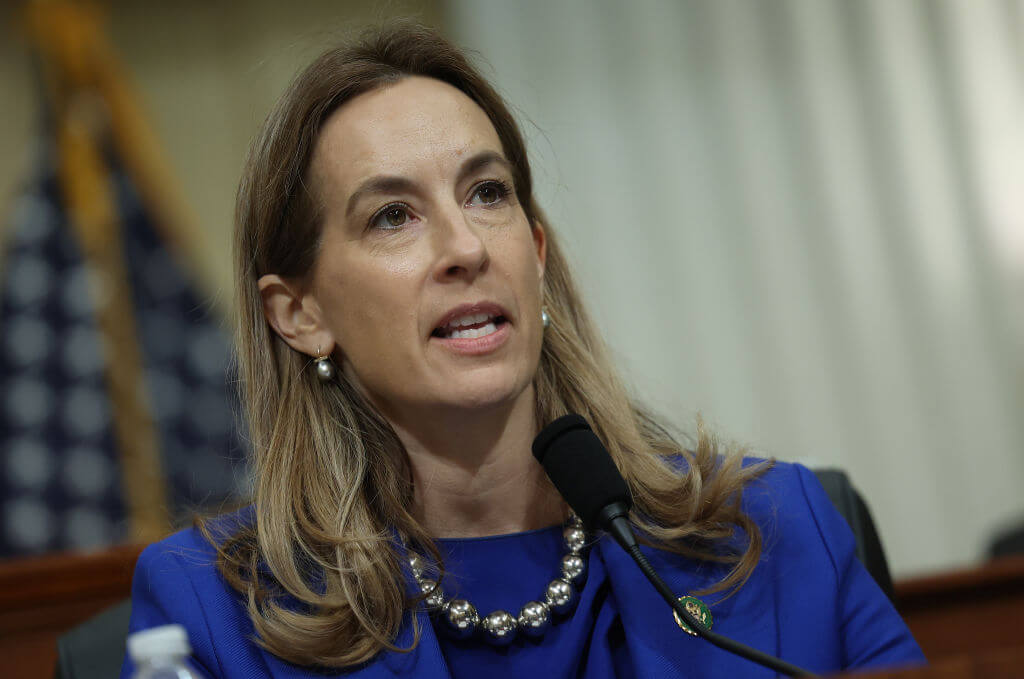
Fast Forward Secretive GOP firm distorts Democratic candidate’s views on Israel in NJ governor race
-
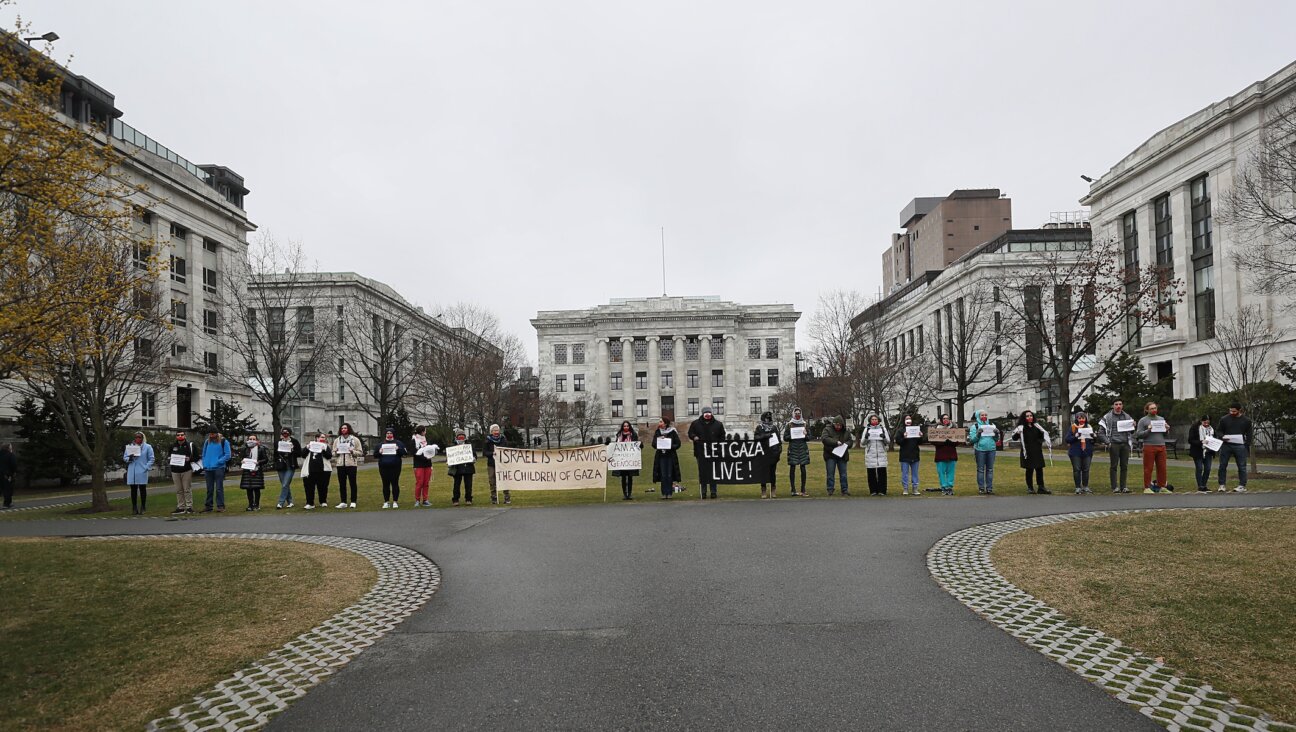
Fast Forward Trump administration to review nearly $9 billion in Harvard funding over campus antisemitism
-
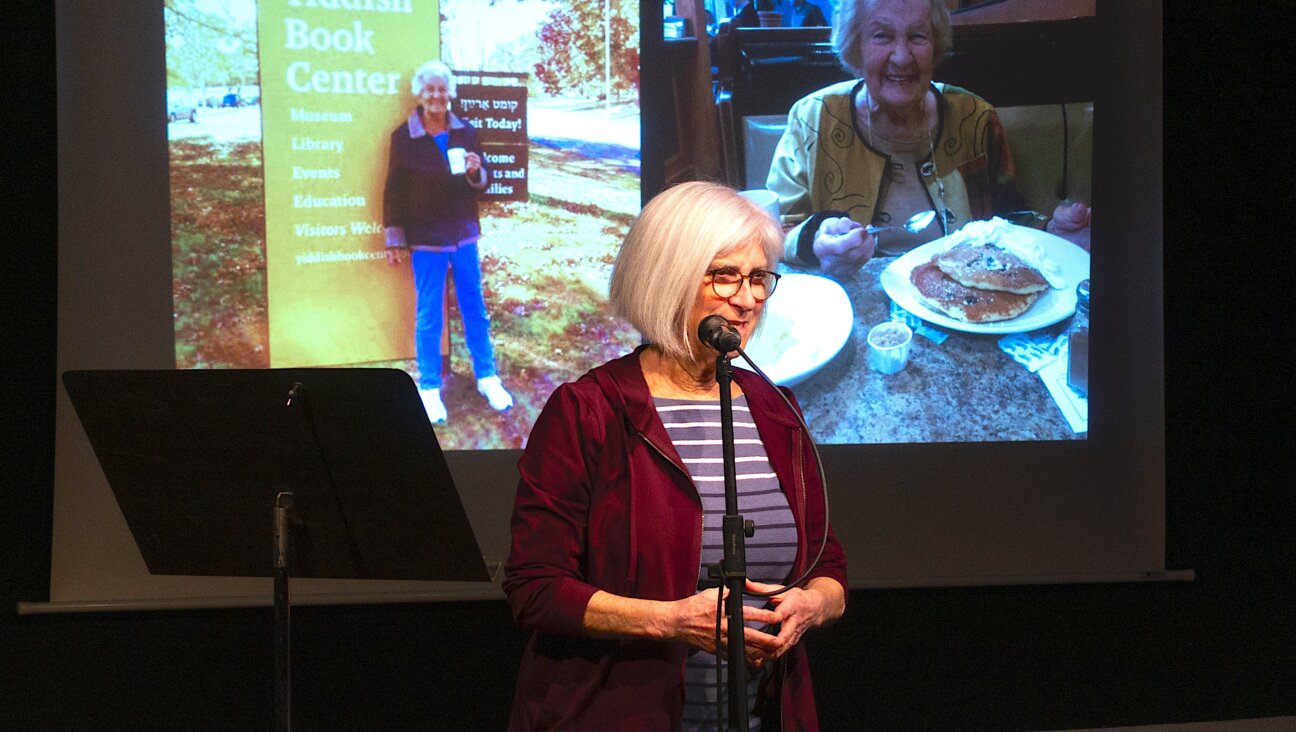
Yiddish World Yiddish fans in Berlin launch a Yiddish open mic series
-

Fast Forward Cornell pro-Palestinian student leader opts to leave US, as Columbia ‘self-deportee’ makes her case to return
-
Shop the Forward Store
100% of profits support our journalism
Republish This Story
Please read before republishing
We’re happy to make this story available to republish for free, unless it originated with JTA, Haaretz or another publication (as indicated on the article) and as long as you follow our guidelines.
You must comply with the following:
- Credit the Forward
- Retain our pixel
- Preserve our canonical link in Google search
- Add a noindex tag in Google search
See our full guidelines for more information, and this guide for detail about canonical URLs.
To republish, copy the HTML by clicking on the yellow button to the right; it includes our tracking pixel, all paragraph styles and hyperlinks, the author byline and credit to the Forward. It does not include images; to avoid copyright violations, you must add them manually, following our guidelines. Please email us at [email protected], subject line “republish,” with any questions or to let us know what stories you’re picking up.








